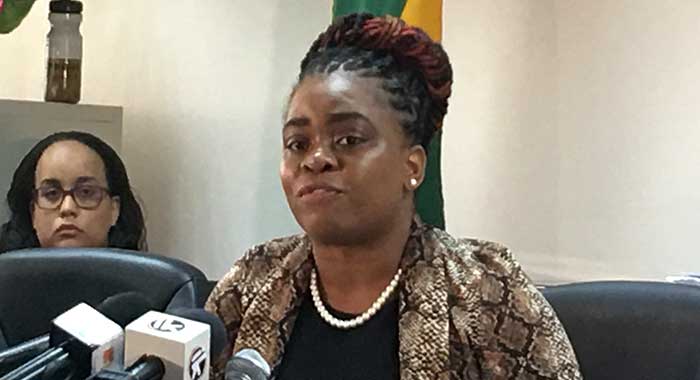A health promotion officer has noted concerns about physical distancing in schools as students return to classes tomorrow, Monday amidst the COVID-19 pandemic.
“In this particular phase, we are not saying that schools should not practise physical distancing,” Shanika John told a press conference in Kingstown on Friday, hosted by Prime Minister Ralph Gonsalves.
“Some teachers and principals have said that they are going to do it because they have the space to do it and we say by all means, if this works for you, fine. We are not saying that it shouldn’t and we are not saying it is something that is compulsory,” John said.
Students are required to wear masks during their commute to and from school and their temperature will be checked daily before classes begin.
“In this instance, we are asking that for everyone within the school that their temperature be checked. That’s for teachers, students and other staff members as well. Whether it is from the tuck shop, etc.
“There’s an elevated temperature, the Ministry of Health would come in, we will do further assessment and we will advise with the next steps.”
John said that in this phase, her ministry has been offering screening of teachers.
“So, to form part of our baseline data, we have offered screening for teachers to do the rapid testing for PCR and that has started and it will continue in this particular phase.”
The government said in April that it will conduct 11,000 tests for COVID-19 antibodies among the general population to try to determine the status of the virus in the country.
However, the prime minister was unable to say on Friday how many of those tests had been conducted so far.
John told the media that for the past two weeks, the Ministry of Health has been working with the Ministry of Education, specifically principals and teachers of the schools across the country.
“The Health Promotion Unit has been very instrumental in sensitising and working with the teachers and principals to ensure that they understand what is expected of them during school, after school hours; the implications it may have for whether or not school operations would continue.”
“So the protocol, as the prime minister would have mentioned, we are asking persons to consider the home as a bubble, the school to be a bubble, which are two of the primary bubbles and any other interaction that you may be doing outside of those bubbles are potentially a risk to contaminating your primary bubbles and this is why we are asking parents … we are asking parents to play their part,” John said.
She said that that part is before students leave for school that their temperature should be checked, adding that this does not have to be done with a non-touch thermometer.
“It can be one of the very simple ones that you put under your arm and you can ask the child the make this his or her routine before they leave [for] school.”
John said that once there is any elevation in the child’s temperature the child should be kept at home.
“If you send your child to school and the school picks up an elevated temperature, the child is then placed in a holding area for further assessment by the Ministry of Health.
“And we stress this specifically because we know that parents have an urgency or a need to just want to go to school and pick up their child and take their child home. So this is extremely important in this particular phase of the reopening to understand that it must be a collaborative effort.”
John said that when the child gets to school and their temperature is normal and classes resume as normal, they will go about their day “within their bubble”.
“When a child is leaving school or just before they arrive to school, we ask them to wear a mask and this mask is just one of the precautionary measures that we have been advising throughout this entire pandemic. And this is a precautionary measure that protects you and the people you may come into contact with,” the health promotion officer said






